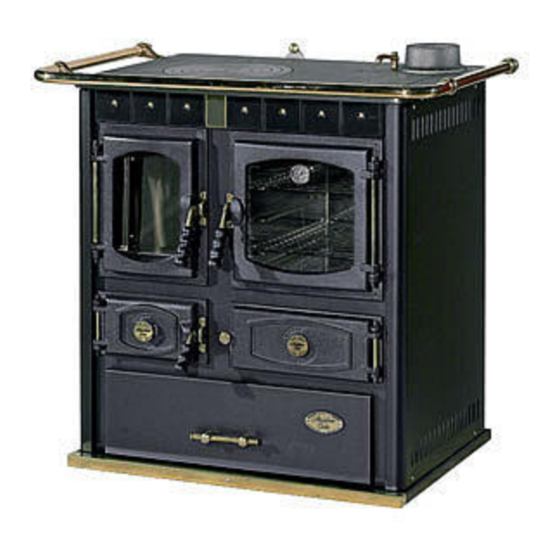- ページ 10
ストーブ Cola MINI JOHANNAのPDF 設置・使用・メンテナンスマニュアルをオンラインで閲覧またはダウンロードできます。Cola MINI JOHANNA 15 ページ。

3.2 Startup
When lighting the stove the first time, bad odours may be created, therefore air the room thoroughly.
When lighting the stove the first time, allow it to burn with a low flame for several hours (air control on ash door open
30%) and with very little fuel.
The heat can then be increased a little at a time, so that the stove expands slowly and the sealants and putties dry.
During the heating and cooling cycles, the combustion chamber in refractory cement undergoes heat stress and
expansion, which causes fine cracks to form. Such cracks do not affect stove efficiency or its service life.
3.3 Lighting and controlling the fire
To light the fire, it is advisable to use small sticks of wood and newspaper, or other means available on the market
(excluding any solid or liquid flammable and/or explosive substance).
During the lighting stage, the air controls on the fire door must be fully open; once the stove is lit, they are used to
regulate the heat output. During this stage it is also advisable to open the damper by moving the lever to position A.
When the stove is hot, adjust the primary and secondary air and close the damper by moving the lever to position Z.
Never use petrol, alcohol or other flammable liquids to light the fire.
3.4 Adjusting the combustion air
Primary air:
the primary air is adjusted using the manual revolving controls located on the ash door, and feeds the fire through the
grate.
Secondary air:
the secondary air enters the stove by means of the control located on the back.
Optimum combustion conditions are obtained when, on loading wood, the air necessary for combustion enters through
the grate, whereas the secondary air, entering through air control, ensures the completion of combustion in the upper
part of the firebox.
3.5 Normal operation
Remove the ash from the grate every time before loading fuel. Put 2-3 logs of wood on the bed of embers.
Despite the large capacity of the combustion chamber, it is advisable to only load a max. of 2-3 logs at a time.
Overloading does not increase efficiency, but will overheat the stove, damaging it.
3.6 Operation with slow combustion
Heat output can be controlled by reducing the combustion air. To guarantee operation for many hours at low heat, the
primary and secondary air controls must be opened at minimum.
With partial feed operation, a patina may form on the glass due to the low temperature in the combustion chamber.
In any case, a continuous fire with low output is not advisable.
3.7 Operation in off season
With outside temperatures above 15° C, the draught m ay be affected, resulting in a decrease in heat output and
therefore flue gases not completely exhausted (smell of smoke in the room). In this case it is advisable to remove the
ash from the grate and increase the combustion air. Put less fuel on the fire and clean the grate more frequently.
3.8 Oven operation
The stove has a static oven with capacity of 32 litres, covered entirely in stainless steel sheet and provided with 2
grilles for holding trays.
A thermometer installed on the glass of the enamelled door shows the oven temperature.
When the stove is lit for the first time, the oven should only be used after 1-2 hours operation at 200-250°C with the
oven door left ajar to eliminate fumes produced by manufacturing process residuals such as grease, oil and sealants.
To reach adequate cooking temperatures, make sure the damper lever is in position "Z"
and if necessary increase the primary and secondary air.
Clean the oven every time it is used, following the instructions given in the section on cleaning.
9
Mini Johanna
